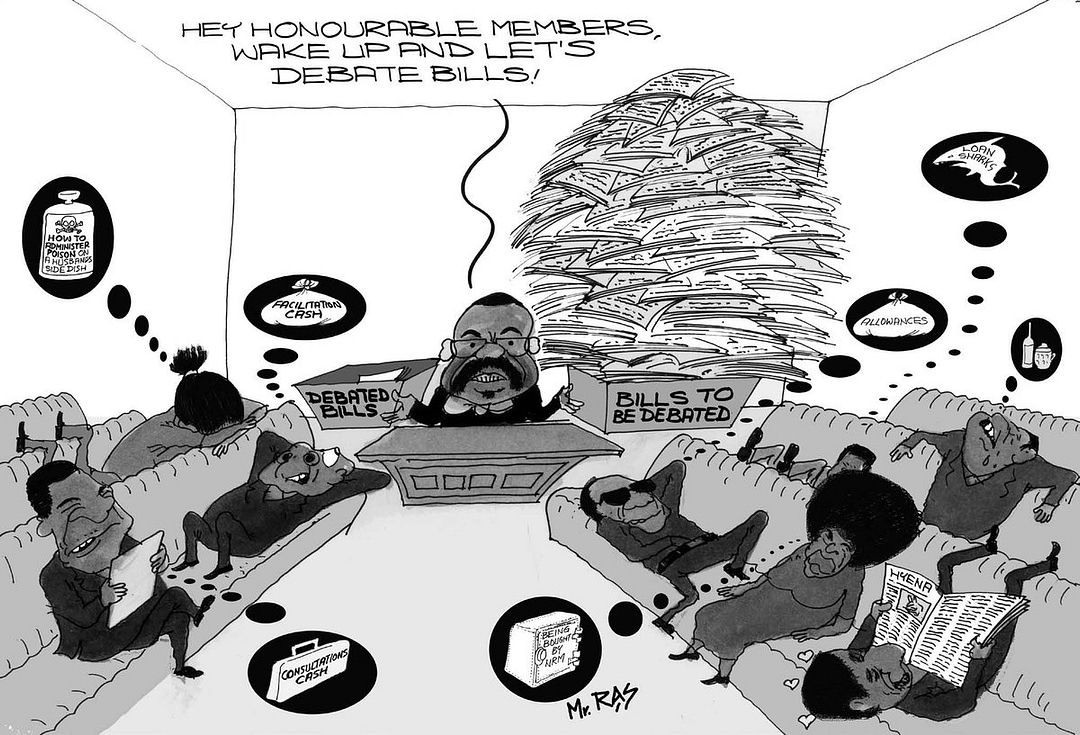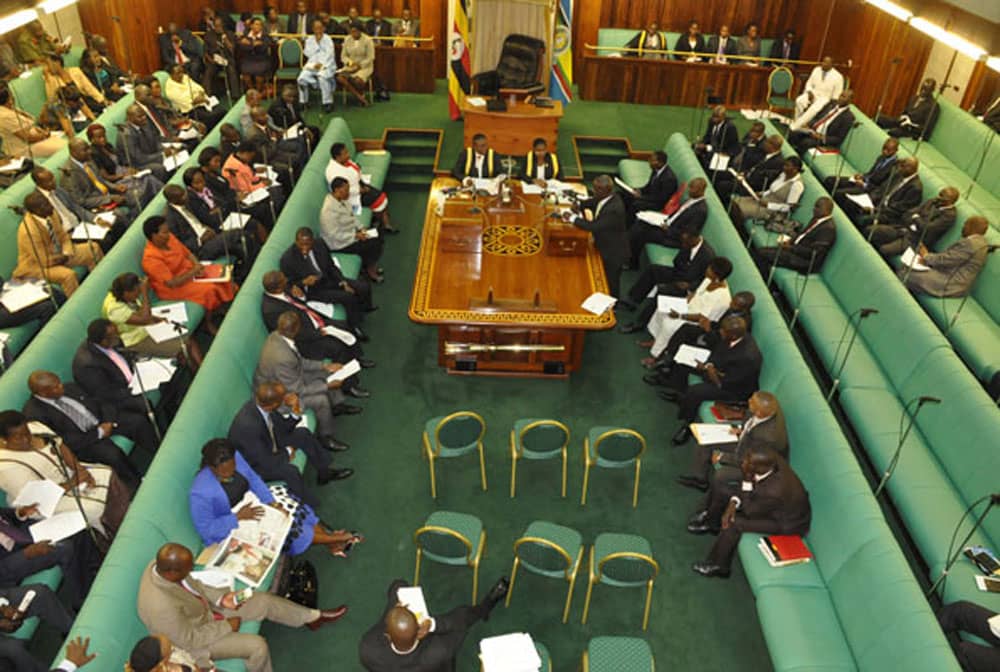“Parliament has never decided how many constituencies Uganda shall be divided into. Instead, it embarked on creating constituencies piecemeal and has ended up with 297 constituencies,” the court documents filed through Victoria Advocates and Legal Consultants, read in part.
“The 214 constituencies remain the only constitutionally recognised constituencies as clearly laid down by the 1996, 2001 and 2005 Acts of Parliament. The addition of one constituency in 2006, 22 [constituencies] in 2011, 51 in 2016 and a further six [municipalities in the run up] to 2016 elections are all illegal constituencies.”
 A former Member of Parliament (MP) has petitioned the Constitutional Court challenging the legality of at least 83 constituencies he says were illegally created by Parliament, in cahoots with the Executive and Electoral Commission (EC).
A former Member of Parliament (MP) has petitioned the Constitutional Court challenging the legality of at least 83 constituencies he says were illegally created by Parliament, in cahoots with the Executive and Electoral Commission (EC). The ingredients of former Bufumbira East MP Eddie Kwizera’s case filed in the Constitutional Court on May 10 point to what his lawyer, Mr Wandera Ogalo, called “impunity” and “expediency” in the handling of critical matters of State.
The petitioner claims that the right number of geographical constituencies in Uganda today must be 214, not the 297 which are represented in the 10th Parliament.
The Parliamentary Elections (Interim Provisions) Act, 1996 was repealed by the Parliamentary Elections Act, 2001 but the first schedule containing only 214 constituencies was saved until Parliament prescribes new constituencies under Article 63 of the Constitution.
In his petition, Mr Kwizera asserts that the resolutions of Parliament creating additional 83 constituencies, including the recently created six municipalities of Kotido, Nebbi, Bugiri, Ibanda, Apac and Sheema, violated Articles 61(c) 63(2) and 91(1) of the Constitution.
Articles 61 and 63 are about how Constituencies are to be created. Article 91(1) reads: “Subject to the provisions of this Constitution, the power of Parliament to make laws shall be exercised through bills passed by Parliament and assented to by the President.” Based on this, the petitioner argues that Parliament can only create constituencies through an Act of Parliament, not by a mere resolution.
The petitioner has argued that the resolution creating the Apac, Sheema, Ibanda, Nebbi, Bugiri, and Kotido as Parliamentary constituencies was unconstitutional, null and void, adding that “the districts did not resolve to upgrade their towns to municipalities for purposes of gaining a parliamentary seat. They were even aware that creation of parliamentary constituency requires an Act of Parliament. It is surprising that councillors are aware of this and parliamentarians are not.”
For instance, Article 61(1) (b) prescribes one of the functions of the EC as: “to demarcate constituencies in accordance with the provisions of this Constitution”. This mandate was usurped by Parliament and the Executive in disregard of Article 63(2) that requires that the EC demarcate constituencies to ensure that each county has at least one MP.
By press time, EC chairman Justice Simon Byabakama Mugenyi and the secretary to the commission, Mr Sam Rwakoojo, were unavailable for a comment but the electoral body spokesperson, Mr Jotham Taremwa, said the creation of constituencies “does not concern EC” even as Mr Ogalo averred that the Constitution is very clear, “matters relating to curving boundaries of new constituencies is a preserve of the EC.”
Mr Ogalo added: “Parliament has no authority whatsoever to change the boundaries of constituencies as it did by curving geographical areas out of existing constituencies and designating them new parliamentary constituencies. That was a naked usurpation of a function of the EC.
The petitioner avers that Article 63(1) of the Constitution and Section 11 of the Electoral Commission Act, which Parliament claims to have used in the creation of the disputed constituencies through motions , do not empower Parliament to demarcate parliamentary constituencies.
“What the two provisions (63(1) and Section 11 of EC Act, however, do, is to authorise Parliament to determine the number of constituencies Uganda shall be divided into. That is where the authority of Parliament stops. The rest is the work of the EC,” he states.
The petitioner avers that even if the 82 constituencies were legally created with an Act of Parliament as opposed to mere resolutions/ motions, Article 63 (6) requires that “where the boundary of a constituency established under this Article is altered as a result of a review, the alteration shall come into effect upon the next dissolution of Parliament.”
“Given that the elections were held in 2016, dissolution of Parliament under Article 96 of the Constitution will be in 2021. It is only in 2021 that elections for the newly created municipalities can constitutionally be held,” Mr Kwizera said.
He added: “EC should be allowed to do its mandate as prescribed in the Constitution… it’s illegal for Parliament to do the work of EC.”
Although Deputy Attorney General Mwesigwa Rukutana alluded to an anonymous Constitutional provision which empowers government to create counties, Mr Ogalo explained that “if the arguments of the respondents [Attorney General and EC] are correct, then clearly Article 63(1) is permitted to destroy Article 61(1) (c) of the Constitution. It would mean a departure from reading the Constitution as a whole as Article 63(1) will have to be read in isolation of Article 61(1). The rule of harmony and completeness.”On July 15, 2015, the then minister for Local Government, Adolf Mwesigye presented a Motion for a Resolution of Parliament to approve the creation of 39 counties under Art 179(4) of the Constitution and Sec 7(7) of the Local Government Act Cap 243.
But in her minority report in July 2015, Shadow Local Government Minister and Mukono Municipality MP Betty Nambooze raised alarm and attempted to block a government resolution that sought to create 39 counties, but failed. She described the Local Government’s legal basis as illegal and wondered why EC didn’t drive the process.
Ms Nambooze accused the Local Government minister of disguising constituencies with counties. “It is the EC which could have been the appropriate agency to champion this process under Article 63 (5) of the Constitution, which states that subject to clause (1) of this article, the Commission shall review the division of Uganda into constituencies within 12 months after the publication of results of a census of the population of Uganda and may as a result re-demarcate the constituencies.”
The constituencies
Bughendera County
Ajuri County
Iki-Iki County
Bushenyi Ishaka Municipality
Busia Municipality
Bunyole West County
Budiope East County
Hoima Municipality
Iganga Municipality
Dodoth West County
Buyaga West County
Bugangaizi East County
Kasese Municipality
Toroma County
Masindi Municipality
Kasambya County
Mukono Municipality
Nakaseke North County
Budyebo County
Bukoli Island County
Ntungamu Municipality
Agule County
Katerera County
Rukungiri Municipality
Adjumani East County
Agago North County
Orungo County
Kilak North County
Kibale County
Buyamba County
Dakabela County
Mawogola North County
Tororo North County
Kira Municipality
Aringa North County
Aringa South County
Ora County
Tochi County
Aruu North County
Lower Madi County
Terego East County
Lutseshe County
Kachumbala County
Bukomansimbi South County
Elgon County
Dokolo South County
Gomba West County
Ligorobya County
Ik County
Bulamogi North West County
Kamuli Municipality
Kibale East County
Kapchorwa Municipality
Kabweri County
Kashongi County
Kibanda North County
Kisoro Municipality
Chua East County
Kitgum Municipality
Koboko North County
Koboko Municipality
Kole North County
Kanyum County
Kumi Municipality
Butemba County
Kyaka South County
Mwenge Central County
Luuka South County
Maracha East County
Kashari South County
Ruhinda North County
Mityana Municipality
Tepeth County
Bukuya County
Mubende Municipality
Bukono County
Bugiri Municipality
Nebbi Municipality
Kotido Municipality
Sheema Municipality
Ibanda Municipality
Apac Municipality
The law
What it says. The Parliamentary Elections (Interim Provisions) Act, 1996 was repealed by the Parliamentary Elections Act, 2001 but the first schedule containing only 214 constituencies was saved until Parliament prescribes new constituencies under Article 63 of the Constitution.
The contention. In his petition, Mr Kwizera asserts that the resolutions of Parliament creating additional 83 constituencies, including the recently created six municipalities of Kotido, Nebbi, Bugiri, Ibanda, Apac and Sheema, violated Articles 61(c) 63(2) and 91(1) of the Constitution.
EC, Attorney General speak out
Key stakeholders have spoken out about a new petition challenging the creation of 83 constituencies. The Electoral Commission (EC) and the Attorney General are joint respondents to the petition filed in the Constitutional Court by former Bufumbira East MP Eddie Kwizera.
“Why should we be bothered when an issue does not concern EC,” EC spokesperson Jotham Taremwa told the media.
The EC is, through Article 61 (3), mandated to initiate the creation of constituencies, but the petitioner argues that its powers were usurped by the Executive and handed to the Ministry of Local Government.
“Now that he has gone to court, he will be informed how the constituencies were created,” Mr Taremwa said.
The Clerk to Parliament, Ms Jane Kibirige, could not be drawn into commenting about how Parliament allowed the Local Government ministry to create the constituencies.
“The best answer would come from the Attorney General,” Ms Kibirige said.
Deputy Attorney General Mwesigwa Rukutana said he is aware of the law on creating constituencies, saying he did not know what the grievances of the petitioner were in this case.
“There is another provision that every county would be represented by one Member of Parliament. The moment government creates a county, it automatically becomes a constituency,” Mr Rukutana noted.
He said the government was ready to defend its position on the creation of the constituencies.
“If we find that there were discrepancies in the way the constituencies were created, we shall rectify it,” Mr Rukutana said.
By Tom Malaba
- Uganda Politics - 9th March 2024
- POLITICIANS THINK THAT UGANDA OWES THEM ENTITLEMENT - 13th May 2023
- THE YOWERI MUSEVENI DICTATORSHIP MONARCHY - 13th May 2023



















